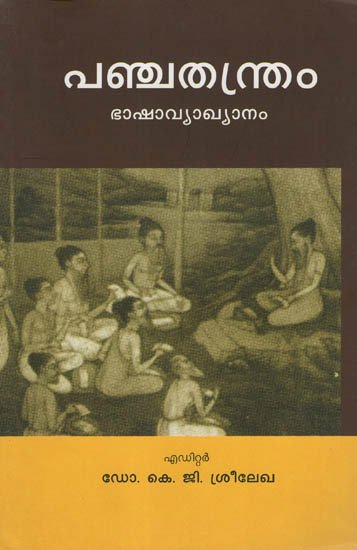Panchatantra [sanskrit]
by Dr. Naveen Kumar Jha | 2016 | 13,828 words | ISBN-13: 9788193077962
The Sanskrit edition of the Panchatantra referencing the English translation and grammatical analysis. Written by Vishnu Sharma and possibly dating as early as 1200 BCE, the Panchatantra (or Pancatantra) represents a collection of short stories teaching basic ethical values and moral conduct that was commonly practiced in ancient Indian. Alternative titles: Śrīviṣṇuśarman Pañcatantra (श्रीविष्णुशर्मन् पञ्चतन्त्र, Śrī-viṣṇuśarman pancatantra, श्री-विष्णुशर्मन्, Sri-visnusarman)
Verse 1.414
नराधिपा नीच-जनानुवर्तिनो बुधोपदिष्टेन पथा न यान्ति ये ।
विशन्त्य् अतो दुर्गम-मार्ग-निर्गमं समस्त-सम्बाधम् अनर्थ-पञ्जरम् ॥ ४१४ ॥
narādhipā nīca-janānuvartino budhopadiṣṭena pathā na yānti ye |
viśanty ato durgama-mārga-nirgamaṃ samasta-sambādham anartha-pañjaram || 414 ||
The English translation of Panchatantra Verse 1.414 is contained in the book The Complete Pancatantra: Sanskrit Text with English Translation by Dr. Naveen Kumar Jha. This book is not available online so in order to read the full text and translation you should buy the book:
Buy now! English translation by Dr. Naveen Kumar Jha (2016)
Glossary of Sanskrit terms
Note: This extracts Sanskrit terms and links to English definitions from the glossary, based on an experimental segmentation of verse (1.414). Some terms could be superfluous while some might not be mentioned. Click on the word to show English definitions.
Naradhipa, Nica, Jana, Budha, Budh, Upadishta, Patha, Yantin, Yanti, Yah, Yat, Atah, Durgama, Marga, Nirgama, Samasta, Sambadha, Anartha, Panjara,
Analysis of Sanskrit grammar
Note: this is an experimental feature and only shows the first possible analysis of the Sanskrit text (Panchatantra Verse 1.414). If the system was successful in segmenting the sentence, you will see of which words it is made up of, generally consisting of Nouns, Pronouns, Verbs, Participles and Indeclinables. Click on the link to show all possible derivations of the word.
- Line 1: “narādhipā nīca-janānuvartino budhopadiṣṭena pathā na yānti ye ”
- narādhipā* -
-
narādhipa (noun, masculine)[nominative plural], [vocative plural]
- nīca -
-
nīca (noun, masculine)[compound], [vocative single]nīca (noun, neuter)[compound], [vocative single]
- janān -
-
jana (noun, masculine)[accusative plural]
- uvar -
-
ū (noun, masculine)[instrumental single]ū (noun, feminine)[instrumental single]√u (verb class 1)[perfect active first dual], [perfect active second plural]√u (verb class 2)[perfect active first dual], [perfect active second plural]√u (verb class 5)[perfect active first dual], [perfect active second plural]√vā (verb class 1)[perfect active first single], [perfect active third single]
- ṛtino -
-
- budho -
-
budha (noun, masculine)[compound], [vocative single]budha (noun, neuter)[compound], [vocative single]budhā (noun, feminine)[nominative single]budh (noun, masculine)[instrumental single]budh (noun, neuter)[instrumental single]
- upadiṣṭena -
-
upadiṣṭa (noun, masculine)[instrumental single]upadiṣṭa (noun, neuter)[instrumental single]
- pathā* -
-
patha (noun, masculine)[nominative plural], [vocative plural]
- na -
-
na (indeclinable particle)[indeclinable particle]na (noun, masculine)[compound], [vocative single]na (noun, neuter)[compound], [vocative single]
- yānti -
-
yāntin (noun, masculine)[compound], [adverb]yāntin (noun, neuter)[compound], [adverb], [nominative single], [accusative single]yāntī (noun, masculine)[adverb]yāntī (noun, feminine)[compound], [adverb], [vocative single]yāntī (noun, neuter)[compound], [adverb], [nominative single], [vocative single], [accusative single]
- ye -
-
ya (noun, masculine)[nominative plural]yā (noun, feminine)[nominative dual], [accusative dual]yaḥ (pronoun, masculine)[nominative plural]yat (pronoun, neuter)[nominative dual], [accusative dual]yā (pronoun, feminine)[nominative dual], [accusative dual]
- Line 2: “viśanty ato durgama-mārga-nirgamaṃ samasta-sambādham anartha-pañjaram ”
- Cannot analyse viśanty*at
- ato* -
-
ataḥ (indeclinable)[indeclinable]
- durgama -
-
durgama (noun, masculine)[compound], [vocative single]durgama (noun, neuter)[compound], [vocative single]
- mārga -
-
mārga (noun, masculine)[compound], [vocative single]mārga (noun, neuter)[compound], [vocative single]√mārg (verb class 1)[imperative active second single]
- nirgamam -
-
nirgama (noun, masculine)[adverb], [accusative single]
- samasta -
-
samasta (noun, masculine)[compound], [vocative single]samasta (noun, neuter)[compound], [vocative single]
- sambādham -
-
sambādha (noun, masculine)[adverb], [accusative single]sambādha (noun, neuter)[adverb], [nominative single], [accusative single]sambādhā (noun, feminine)[adverb]
- anartha -
-
anartha (noun, masculine)[compound], [vocative single]anartha (noun, neuter)[compound], [vocative single]√arth (verb class 1)[perfect active first single], [perfect active second plural], [perfect active third single]
- pañjaram -
-
pañjara (noun, masculine)[adverb], [accusative single]pañjara (noun, neuter)[adverb], [nominative single], [accusative single]
Other editions:
Also see the following editions of the Sanskrit text or (alternative) English translations of the Panchatantra Verse 1.414
Pancatantra of Visnusarman
by M. R. Kale (2015)
Panchatantra in Simple Sanskrit
by Dr. Vishwas (2016)
Panchatantram (Telugu)
by Tadanki Venkata Lakshmi Narasimha Rao (2020)
Published by J. P. Publications, Vijayawada; Throughout black & white Illustrations; 9788192053851.
Buy now!Preview of verse 1.414 in Telugu sript:
నరాధిపా నీచ-జనానువర్తినో బుధోపదిష్టేన పథా న యాన్తి యే ।
విశన్త్య్ అతో దుర్గమ-మార్గ-నిర్గమం సమస్త-సమ్బాధమ్ అనర్థ-పఞ్జరమ్ ॥ ౪౧౪ ॥
Panchatantram Bhashavyakhyanam (Malayalam)
by Dr. K.G. Sreelekha (2010)
Published by the University of Kerala.
Buy now!Preview of verse 1.414 in Malayalam sript:
നരാധിപാ നീച-ജനാനുവര്തിനോ ബുധോപദിഷ്ടേന പഥാ ന യാന്തി യേ ।
വിശന്ത്യ് അതോ ദുര്ഗമ-മാര്ഗ-നിര്ഗമം സമസ്ത-സമ്ബാധമ് അനര്ഥ-പഞ്ജരമ് ॥ ൪൧൪ ॥
The Panchatantra Stories (Tamil)
by P. S. Aacharya (2017)
Published by Narmadha Pathippagam, Chennai.
Buy now!
Panchatantrer Galpa (Bengali)
by Children's Book Trust (2014)
Throughout color Illustration; 9788170112730
Buy now!Preview of verse 1.414 in Bengali sript:
নরাধিপা নীচ-জনানুবর্তিনো বুধোপদিষ্টেন পথা ন যান্তি যে ।
বিশন্ত্য্ অতো দুর্গম-মার্গ-নির্গমং সমস্ত-সম্বাধম্ অনর্থ-পঞ্জরম্ ॥ ৪১৪ ॥
Panchatantra in Gujarati (Comic)
by Anant Pai (2013)
[શિયાળા અને રણશિંગ પંચતંત્ર] Published by Amar Chitra Katha; Throughout Color Illustrations; 9789350853115
Buy now!Preview of verse 1.414 in Gujarati sript:
નરાધિપા નીચ-જનાનુવર્તિનો બુધોપદિષ્ટેન પથા ન યાન્તિ યે ।
વિશન્ત્ય્ અતો દુર્ગમ-માર્ગ-નિર્ગમં સમસ્ત-સમ્બાધમ્ અનર્થ-પઞ્જરમ્ ॥ ૪૧૪ ॥
![Panchatantra [sanskrit] - book cover](/uploads/a/Pancatantra.jpg)






